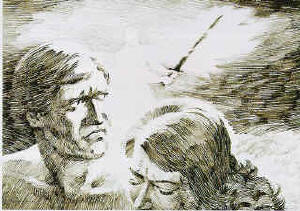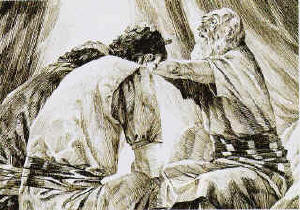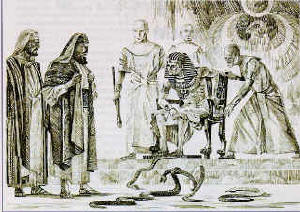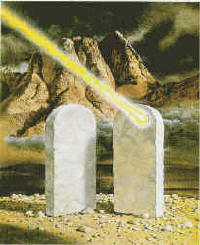The Bible: The Beginning – the First Five Books of the Bible
The first book of the Old Testament is Genesis, often subtitled “The First Book of Moses.” Tradition says it was written by Moses, though the book itself does not identify its author.” Genesis” means “beginning,” which is appropriate, since this book contains a simple but profound story of the creation of the world. This is not intended to be a scientific explanation. The Bible tells us that God did it, but not how.
The Bible makes an important distinction between humans and other living creatures. The animals were made after their kind (Genesis 1:25), but humans were made in the likeness and image of God (verse 26).
 |
| “God sent them out of the Garden of Eden” Genesis 3:23-24 |
Genesis tells us that God established an environment for Adam and Eve in the Garden of Eden and gave them a choice, symbolized by two trees (Genesis 2:17). Eve decided to eat of the fruit of the forbidden tree after she listened to the serpent (identified in the New Testament as Satan, the devil), and Adam made the same decision. Their act led to banishment from the garden, leaving them to make their own way in the world, where they and their descendants eventually surely died, just as God had said.
Adam and Eve were typical of us all. At this early time, and in this simple setting, they showed that humans, if allowed to choose whether to trust and obey God, could choose to take matters into their own hands. Their decision set the course for the grim trail of war, hatred and strife that has marked human history.
We got off to a bad start in the Garden of Eden. Yet by the time we reach the last chapters of the Bible’s last book, we will see that in spite of our grim past and uncertain present, we humans face a positive future. God has a plan to save humans, and the Bible tells us about that plan. It is, above all, a story of hope!
But we are getting ahead of ourselves. Let’s continue in Genesis. The human race became increasingly violent and corrupt over the next few hundred years. Eventually God intervened. God told Noah to build an ark in which Noah, his immediate family and two of each kind of animal could be protected, while other life perished in a great flood. After this flood, it wasn’t long before Noah’s descendants rebelled again. God again thwarted man’s rebellion by confusing his language, making it necessary for tribes to disperse.
In its opening chapters, the Bible uses broad strokes to paint a picture of how and why humanity became alienated from God and started on a way of life that leads to death. The Bible now narrows its focus to tell the rest of the story from the point of view of one branch of the human family, the people of Israel. (Whenever we refer to “Israel,” we mean the people of ancient Israel who lived in the Middle East thousands of years ago, and not the Jewish state that was established in 1947.)
The history of Israel begins with Abraham. God ordered Abraham to leave his homeland (in modern-day Iraq) and to journey towards a distant promised land that eventually would be given to him and his descendants as an inheritance. God further promised Abraham that if he remained faithful, all the people of the earth would be blessed through him. God used Abraham and his family to play an important role in the plan of salvation for the human race.
 |
| Jacob blessed Joseph’s sons, Ephraim and Manasseh – Genesis 48:20 |
 |
| “Aaron’s rod swallowed up their rods” Exodus 7:12 |
The story continues with the experiences of Abraham’s son Isaac, and then of Isaac’s son Jacob. God changed Jacob’s name to Israel (Genesis 35:10). Israel had 12 sons; these sons and their descendants were known as “the children of Israel” or “the twelve tribes of Israel.” The remaining chapters of Genesis describe how famine led the children of Israel to move to Egypt. The stage is set for the second book of the Bible.
Exodus
For some time after Joseph’s death, the Israelites lived among the Egyptians. They prospered and grew until a later Pharaoh began to see them as a security risk and enslaved them (Exodus 1:8-11). God saw Israel’s sufferings and graciously intervened to bring them out of Egypt as his people, to give them the land he had promised to their forefather, Abraham.
Leaving Egypt and slavery behind them, the Israelites arrived at Mt. Sinai, where God made an agreement (or “covenant”) with Israel. The Ten Commandments were the heart of this covenant.
If Israel would obey God, they would be his people (Exodus 19:5-6) and become an example for other nations. But if they chose to disobey, they would forfeit God’s blessings. God had rescued them from slavery and given them a new life as a nation.
Do you notice some parallels between this story and that of Adam and Eve? God gave Israel blessings and then a choice: Trust God and everything will go well. Disobey and negative consequences are inevitable.
Leviticus
The third book of Moses, Leviticus, records laws and statutes that would regulate life and worship in the Promised Land. God was teaching these ancient people that sin has serious consequences, but that it can be forgiven.
Leviticus not only has laws about the ceremonial rituals in the temple, it also has laws about how the Israelites were to live in peace and righteousness with one another. Social responsibilities and worship were woven together.
Numbers
The name of this book is derived from a census in which Moses numbered the tribes as the journey began. It is as much a story of Israel’s failures as it is their successes. Even with continual evidence of God’s support, the children of Israel lacked faith. Time and again on the journey through the wilderness, they complained. Some even threatened to return to Egypt.
The Bible is remarkably honest about Israel’s history. In other nations, patriotic epics usually glorify a people’s strengths, while minimizing their failures and weaknesses. Not so the Bible. It is relentlessly realistic about the chosen people’s lack of trust and confidence in their God.
After a year or so of wandering, Israel arrived on the frontier of the Promised Land. Moses sent scouts to survey the territory, but after 40 days most brought back a negative report. Most of the spies did not have faith in God, and they encouraged the people to return to Egypt.
This was an important lesson for Israel. God had promised he would guide Israel to success. But Israel had to learn to trust him. But because of Israel’s lack of faith, God said that Israel would have to spend 40 years wandering before they would enter the Promised Land. The people who complained would not receive the land.
Deuteronomy
The name of this last of the five books often referred to as the books of Moses comes from a Greek word meaning “second law.” The law was given again. Just before the Israelites entered the land, the aged Moses reminded them of their covenant with God. He rehearsed their prolonged lack of faith and explained again why they wandered in the desert for 40 years.
Moses carefully rehearsed the laws and statutes that were to undergird the new society. He encouraged the Israelites to remain faithful to God so that their new lives in the Promised Land would be successful (Deuteronomy 30:19).
At the age of 120, Moses died (Deuteronomy 34:5, 9). Before Moses’ death, God guided him to appoint Joshua as his successor.
|
Some laws in the Old Testament may at first seem rather old-fashioned. But look again. Many of them confront the same issues that plague society today: crime, corruption, poverty, greed and even the destruction of the environment. Here are timeless, logical, commonsense principles that would help any people at any time build a fair and just society. Notice, for example, these laws: Exodus 21:35-36: “If a man’s bull injures the bull of another and it dies, they are to sell the live one and divide both the money and the dead animal equally. However, if it was known that the bull had the habit of goring, yet the owner did not keep it penned up, the owner must pay, animal for animal, and the dead animal will be his.” Exodus 22:7: “If a man gives his neighbor silver or goods for safekeeping and they are stolen from the neighbor’s house, the thief, if he is caught, must pay back double.” Exodus 22:26-27: “If you take your neighbor’s cloak as a pledge, return it to him by sunset, because his cloak is the only covering he has for his body. What else will he sleep in? When he cries out to me, I will hear, for I am compassionate.” Leviticus 19:9-10: “When you reap the harvest of your land, do not reap to the very edges of your field or gather the gleanings of your harvest. Do not go over your vineyard a second time or pick up the grapes that have fallen. Leave them for the poor and the alien. I am the Lord your God.” Leviticus 19:15: “Do not pervert justice; do not show partiality to the poor or favoritism to the great, but judge your neighbor fairly.” Deuteronomy 20:19: “When you lay siege to a city for a long time, fighting against it to capture it, do not destroy its trees by putting an ax to them, because you can eat their fruit. Do not cut them down. Are the trees of the field people, that you should besiege them?” Deuteronomy 22:6-7: “If you come across a bird’s nest beside the road, either in a tree or on the ground, and the mother is sitting on the young or on the eggs, do not take the mother with the young. You may take the young, but be sure to let the mother go, so that it may go well with you and you may have a long life.” Deuteronomy 22:8: “When you build a new house, make a parapet around your roof so that you may not bring the guilt of bloodshed on your house if someone falls from the roof.” Deuteronomy 24:6: “Do not take a pair of millstones – not even the upper one – as security for a debt, because that would be taking a man’s livelihood as security.” Deuteronomy 25:4: “Do not muzzle an ox while it is treading out the grain.” Deuteronomy 25:14-15: “Do not have two differing measures in your house – one large, one small. You must have accurate and honest weights and measures, so that you may live long in the land the Lord your God is giving you.” |
This article was written in 1991, and updated in 2001.
Next chapter: Chosen People, Promised Land: Israel and Judah
Author: John Halford

 Ancient Laws That Are Not Out of Date
Ancient Laws That Are Not Out of Date